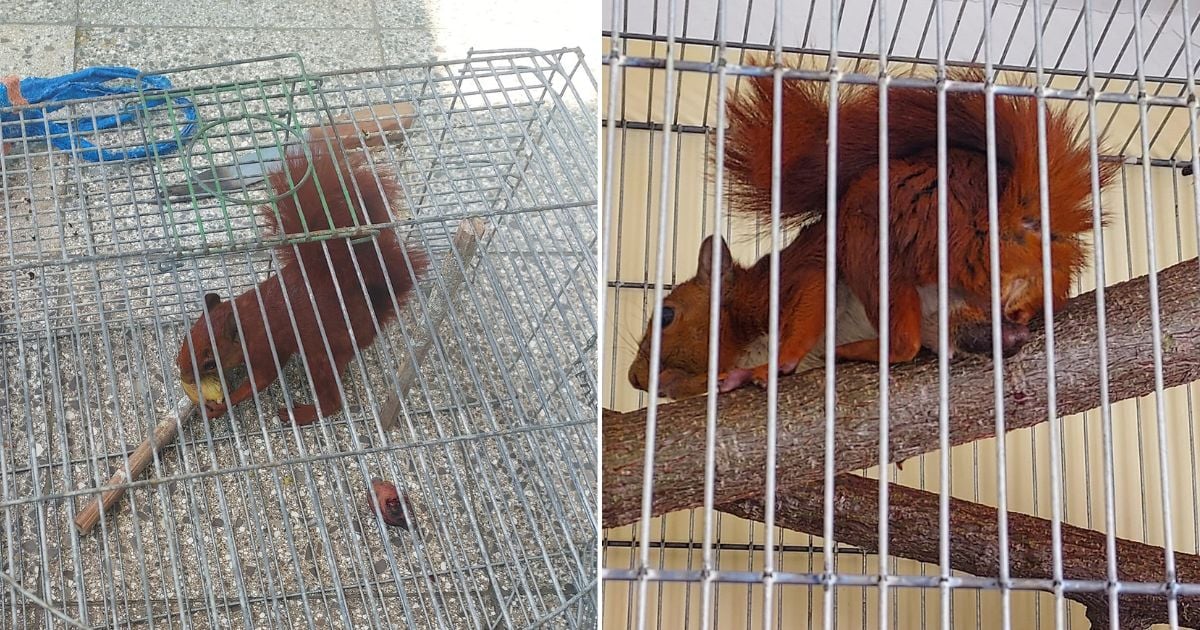An animal protection advocate voiced concerns this Sunday about the actions of Cuban institutions responsible for nature conservation, expressing outrage over the promotion of red squirrel sales in Havana. In a Facebook post, Elizabeth Marela Cardoso Pérez harshly criticized vendors who, according to her, profit from the suffering of animals without any knowledge of their care and management.
“This kind of post makes me very sad for the animals and, at the same time, extremely angry at these good-for-nothings who profit from the suffering of species,” she wrote, emphasizing that buyers also share responsibility by acquiring these animals out of vanity or ignorance about their welfare. “They have no idea how to handle them, because all they care about is the money they can make,” she stated indignantly.
Institutional Accountability Questioned
The activist went further, pointing out that not only the sellers and buyers are at fault, but also the institutions responsible for wildlife protection, which she accused of failing to perform their duties: “Where is Flora and Fauna? This is public, and they do nothing,” she denounced, highlighting the authorities' inaction in controlling species trafficking.
Additionally, she lamented that the existing reporting mechanisms are ineffective, calling them “unbearable and inoperative.” Cardoso also criticized the bureaucracy that allows criminals to act without restraint, considering that the lack of committed officials to protect wildlife only exacerbates the situation, leaving the animal advocacy community feeling increasingly unprotected.
Alongside her strong criticism, she shared several screenshots of social media posts promoting the sale of red squirrels. “Pet lovers. I have very cute red squirrels for your home. I’m from Havana, Lawton. Interested parties, please DM,” reads one of the ads posted by user Jose Canitrot.
The same person, as seen in another screenshot, posted that he was looking for someone to hunt red squirrels in the Puente Grande area: “I’ll buy them all,” he stated. Another Facebook profile, under the name China MI, reported in the group “SOS Callejeros. Cuba” that Jose Canitrot himself had made a post promoting the sale of this species.
The shared screenshots show several cages with red squirrels confined inside. Red squirrels are an invasive species that have also found people who enjoy seeing them in the wild, as shown in a video shared by the news portal CubaNet. However, the current economic crisis has led many people to seek income through unusual means, such as the commercialization of wild or invasive species.
In 2021, animal rights activist Javier Larrea reported on his Facebook profile the alleged sale of a bat on the island for 4,000 pesos. Another activist, Beatriz Batista, denounced in 2020 the sale of an owl for religious purposes through the classifieds platform Revolico: “The more time passes in this absurdity of turning a blind eye, being complicit in lifeless animal bodies... the more we develop as an ignorant and cruel society,” she said.
In 2021, the Office of Environmental Regulation and Safety of Cuba reported an increase in the illicit trade of wild birds and other species. According to the state-run media Cubadebate, the demand for these species is driven by their use as pets, consumption of their meat, craftsmanship, and certain religious practices.
Although the Cuban regime enacted the Animal Welfare Decree-Law in 2021, ongoing citizen complaints demonstrate its limited effectiveness in practice. Specifically, Article 58, subsection h) states that it is an infraction to “commercialize, transport, possess, capture, reproduce, and any other action involving the handling of animals that violates current regulations.”
Furthermore, Article 83 establishes that the control of wild animal populations can be carried out for justified sanitary reasons, such as excessive growth of individuals of a species, the presence of invasive species or pests, and diseases. However, the culling of these invasive species requires authorization from the competent authorities and must be done swiftly and compassionately.
The 2021 Animal Welfare Decree-Law in Cuba sets strict regulations on the commercialization of live animals, including invasive species, requiring individuals involved in animal trade to possess the necessary licenses and authorizations, in accordance with current legislation. Those who commit these infractions may face fines of up to 1,000 pesos, imposed by the competent authorities.
One of the aspects most criticized by activists is the lack of severity in the Animal Welfare Law regarding crimes affecting animals, including invasive species.
FAQs on Red Squirrel Sales in Havana
In light of the recent controversy over the sale of red squirrels in Havana, here are some frequently asked questions and answers that might be helpful.
Why are red squirrels being sold in Havana?
The current economic crisis has driven many individuals to seek income through unconventional means, such as the sale of wild or invasive species like red squirrels.
What are the legal implications of selling red squirrels in Cuba?
The Animal Welfare Decree-Law of 2021 in Cuba prohibits the unauthorized commercialization, transport, possession, capture, and reproduction of animals, including invasive species like red squirrels. Violators may face fines of up to 1,000 pesos.
How effective is the Animal Welfare Decree-Law in Cuba?
Despite its enactment in 2021, the Animal Welfare Decree-Law has been criticized for its limited effectiveness in practice, as evidenced by ongoing citizen complaints and the continued illegal sale of animals.
